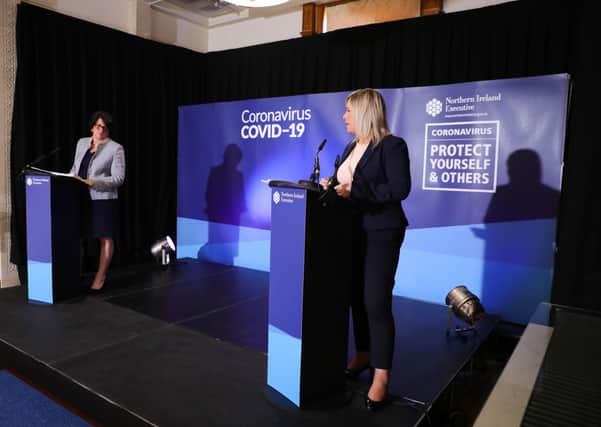Despite higher daily death rate, Republic exiting lockdown faster than NI


Comparisons between different countries are imperfect because of differences in how deaths are recorded, but for the first four days of this week there were no new deaths registered in the daily figures released by Stormont’s Department of Health, and yesterday there was one new death.
In the same five-day period, there have been 25 deaths in the Republic – yet at the end of last week Taoiseach Leo Varadkar announced a major acceleration of its plan to end restrictions.
Advertisement
Hide AdAdvertisement
Hide AdOn Wednesday deputy First Minister Michelle O’Neill told RTE that she thought “we will get to the point of being more aligned” with the Republic after yesterday’s Executive meeting.
However, rather than moving in tandem with either London or Dublin, Stormont has continued to take its own approach to easing or retaining each area of restriction.
Yesterday’s moves add to the patchwork of differing rules across both the UK, and across the island of Ireland.
Although Northern Ireland is now largely moving slower to exit lockdown than the Republic, it is moving faster than the rest of the UK in allowing social contact by allowing groups of up to 10 people to meet outdoors so long as they remain two metres apart, an increase from the current limit of six people meeting outdoors.
Advertisement
Hide AdAdvertisement
Hide AdAnd Northern Ireland is moving faster than the Republic in bringing back retail, with all shops allowed to open from today, while shops south of the border will have to wait until Monday.
A week ago, the Taoiseach announced that Ireland’s route out of lockdown would be condensed from five phases of reopening to four.
That should see the Republic fully re-opened by July 20, although restrictions on mass gatherings may remain into August.
The southern hospitality industry will be able to re-open from the start of next month.
Advertisement
Hide AdAdvertisement
Hide AdStormont’s plan is for hotels to re-open on July 20 – but there is not a date for other hospitality businesses such as pubs and cafes.
Setting a date for hotels is the exception to the rule in Northern Ireland’s route out of lockdown, and only came after intense lobbying by hotels.
In the Republic groups of six people can meet outdoors, while 15 people can meet outdoors for sport and 25 people can meet for a funeral.
The southern plan will also see church services able to restart by June 29, while hairdressers and barbers should be re-opened by July 20.
Advertisement
Hide AdAdvertisement
Hide AdBy contrast, Stormont’s plan is far more vague, without even indicative or aspirational dates, something which Arlene Foster and Michelle O’Neill yesterday again defended.
Mrs Foster said: “We needed to be flexible and therefore by setting dates – and you’ve seen this in the Republic of Ireland actually whereby they set dates and they have had to change those dates – we felt it was right to be flexible and set the parameters of what we were discussing.
“We’ve now got to the stage where we feel that we probably can give indicative dates, depending on the fact that we’re at a particular stage in the transmission of the virus.”
—— ——
A message from the Editor:
Thank you for reading this story on our website. While I have your attention, I also have an important request to make of you.
Advertisement
Hide AdAdvertisement
Hide AdWith the coronavirus lockdown having a major impact on many of our advertisers - and consequently the revenue we receive - we are more reliant than ever on you taking out a digital subscription.
Subscribe to newsletter.co.uk and enjoy unlimited access to the best Northern Ireland and UK news and information online and on our app. With a digital subscription, you can read more than 5 articles, see fewer ads, enjoy faster load times, and get access to exclusive newsletters and content. Visit https://www.newsletter.co.uk/subscriptions now to sign up.
Our journalism costs money and we rely on advertising, print and digital revenues to help to support them. By supporting us, we are able to support you in providing trusted, fact-checked content for this website.
Alistair Bushe
Editor